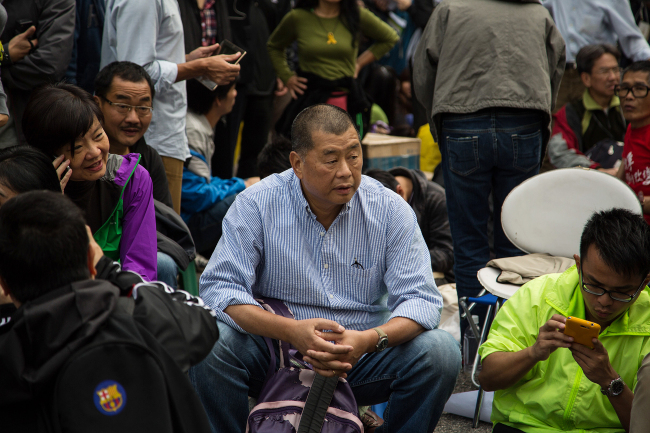Hong Kong media mogul admired and loathed in equal parts
By Korea HeraldPublished : Feb. 3, 2015 - 18:55
Toting a backpack and wearing baggy blue jeans, with a yellow pro-democracy ribbon tacked onto a shirt button, a portly man blends into the flanks of activists waiting to be arrested ― almost.

As Jimmy Lai, 66, was hauled away from the Admiralty protest site by police officers on the afternoon of Dec. 11 last year, the crowd cheered and cameras clicked.
After all, the media mogul is a rarity among Hong Kong’s contingent of tycoons: He is a long-time and outspoken supporter of the city’s pro-democracy movement since its 1997 handover from British to Chinese rule.
And when the Occupy Central campaign lobbying for greater rights for the people to directly elect their chief executive in 2017 emerged in late September last year, the newspaper man very quickly became the news himself.
Not only is the paper he founded in 1995, Apple Daily, an unabashed ― and often strident ― campaigner for the movement, but he personally got involved as well. He donated to the cause, went down almost daily to the tent city in Admiralty, and also helped advise its student leaders.
Nearly a fortnight ago, he was arrested for organizing and participating in an unauthorized assembly. But he was released without being charged.
In anticipation of his arrest, he had stepped down in December as the publisher of Next Media, the holding company of Apple Daily and another publication, Next Magazine.
Lai is a divisive figure in Hong Kong, admired and loathed in equal parts depending on where one stands on the political spectrum.
Long detested by Beijing and its supporters, he became even more of a lightning rod for them in the past year as the city entered an unprecedented phase of political tumult.
He has been accused of consorting with external forces ― namely, the United States ― when documents were leaked detailing his friendship with former US deputy defense secretary Paul Wolfowitz.
Among other things, Lai was shown to have paid Wolfowitz $75,000 for help with projects in Myanmar.
Lai asserted that their relationship went back a long way and that he had never received foreign funding or had any links with foreign powers.
Doubt was also cast on his top aide, American Mark Simon, a former intelligence agent with the U.S. Navy.
More woes followed. Lai was investigated by antigraft officials when more leaked documents showed he had made more than HK$10 million ($1.29 million) in donations to Hong Kong’s pro-democracy legislators ― who did not declare the funds as they had to under legislative rules.
An unruffled Lai said later that his support of the pandemocrats had “always been clear.”
More embarrassing for him, perhaps, were other details showing that he has a taste for the fine life, including spending millions of dollars in 2012 on 9,700 bottles of wine from Bordeaux.
The father of six has also been the target of physical threats, ranging from an uncovered assassination plot in 2008 to an incident in 2013 where a man rammed a car into the gate of his house in Ho Man Tin, leaving behind an ax and a machete on the driveway.
Three weeks ago, petrol bombs were hurled at his home and the Next Media offices in Tseung Kwan O.
Lai’s life in Hong Kong began in a similarly dramatic fashion. In 1960, his family in Guangzhou ― who lost their wealth after the communists took power in 1949 ― smuggled the then 12-year-old to Hong Kong by hiding him in the bottom of a boat.
He scrabbled his way up in life, working first at odd jobs and then as a clerk.
In 1980, he founded a clothing chain called Giordano. But he later sold it when his anti-Beijing views, which hardened during the 1989 Tiananmen incident, got the business into trouble.
The authorities had begun shuttering its stores on the mainland following his characterization of former Chinese premier Li Peng as a “son of a turtle egg” for his role in Tiananmen in a newspaper column in 1993.
After dabbling in various ventures including a failed virtual retail store, he largely focused on his publications, which became hugely popular for their diet of celebrity gossip and political exposes.
Lai calls Apple Daily a “free newspaper.” Its critics say it is a highly biased media outlet.
Its chief editor Cheung Kim Hung told The Straits Times in an interview last year that while it used to carry a 7:3 mix of voices that are critical versus those that are supportive of the establishment, the ratio had changed to 9:1.
While acknowledging that it is “not a healthy development,” he blamed it on Hong Kong’s media environment, which he said has seen greater censorship in other publications, meaning that “certain voices can appear now only in our pages.”
Whatever the reason, it is clear that Lai and his publications will not be wallflowers in Hong Kong’s evolving political landscape.
Li Xueying
(The Straits Times)
-
Articles by Korea Herald












![[Today’s K-pop] BTS pop-up event to come to Seoul](http://res.heraldm.com/phpwas/restmb_idxmake.php?idx=644&simg=/content/image/2024/04/17/20240417050734_0.jpg&u=)





![[KH Explains] Hyundai's full hybrid edge to pay off amid slow transition to pure EVs](http://res.heraldm.com/phpwas/restmb_idxmake.php?idx=652&simg=/content/image/2024/04/18/20240418050645_0.jpg&u=20240419100350)

![[Today’s K-pop] Zico drops snippet of collaboration with Jennie](http://res.heraldm.com/phpwas/restmb_idxmake.php?idx=642&simg=/content/image/2024/04/18/20240418050702_0.jpg&u=)